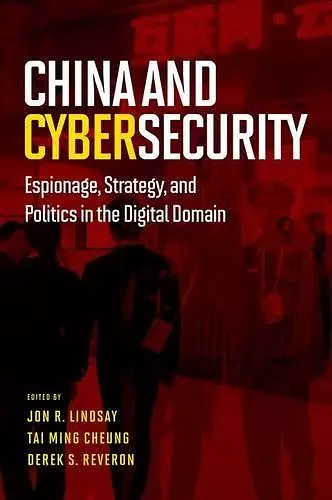China and Cybersecurity
Espionage, Strategy, and Politics in the Digital Domain
Tai Ming Cheung editor Derek S Reveron editor Jon R Lindsay editor
Format:Paperback
Publisher:Oxford University Press Inc
Published:16th Apr '15
Currently unavailable, and unfortunately no date known when it will be back
This paperback is available in another edition too:
- Hardback£137.50(9780190201265)

China's emergence as a great power in the twenty-first century is strongly enabled by cyberspace. Leveraged information technology integrates Chinese firms into the global economy, modernizes infrastructure, and increases internet penetration which helps boost export-led growth. China's pursuit of "informatization " reconstructs industrial sectors and solidifies the transformation of the Chinese People's Liberation Army into a formidable regional power. Even as the government censors content online, China has one of the fastest growing internet populations and most of the technology is created and used by civilians. Western political discourse on cybersecurity is dominated by news of Chinese military development of cyberwarfare capabilities and cyber exploitation against foreign governments, corporations, and non-governmental organizations. Western accounts, however, tell only one side of the story. Chinese leaders are also concerned with cyber insecurity, and Chinese authors frequently note that China is also a victim of foreign cyber---attacks---predominantly from the United States. China and Cybersecurity: Political, Economic, and Strategic Dimensions is a comprehensive analysis of China's cyberspace threats and policies. The contributors---Chinese specialists in cyber dynamics, experts on China, and experts on the use of information technology between China and the West---address cyberspace threats and policies, emphasizing the vantage points of China and the U.S. on cyber exploitation and the possibilities for more positive coordination with the West. The volume's multi-disciplinary, cross-cultural approach does not pretend to offer wholesale resolutions. Contributors take different stances on how problems may be analyzed and reduced, and aim to inform the international audience of how China's political, economic, and security systems shape cyber activities. The compilation provides empirical and evaluative depth on the deepening dependence on shared global information infrastructure and the growing willingness to exploit it for political or economic gain.
"Given the high stakes and enormous gaps between Chinese and American understandings and agendas on cybersecurity, and with the above two chapters as examples, Lindsay and Reveron are certainly justified in concluding that the book "exemplifies" cooperation to improve understanding. It will be worthwhile reading not only for China scholars and cyber-security experts, but also for international relations and communications scholars." --Pacific Affairs "This book's contributors argue that China is not the electronic supervillain it is often thought to be. Despite the regime's hefty investment in digital espionage and cyberwar capabilities, its networks are less secure than those in the United States, the Chinese agencies that make cybersecurity policy are more fragmented than their U.S. counterparts, and the country suffers losses worth close to $1 billion a year because of weak policing of online theft and fraud. China conducts a great deal of industrial espionage, but its enterprises have a hard time filtering and applying the vast amount of data their hackers steal. Looking only at the Chinese side of the relationship, the book does not detail the digital threats that the United States poses to China. But Chinese thinkers believe they are significant, and given China's strategic doctrine of striking first and massively, this creates the risk that in a crisis, Beijing might launch a preemptive cyberattack. The fact that Chinese and Western experts cooperated in this pathbreaking book shows that there is a potential for working together. But there are many obstacles, including the inherent secrecy of the field." -- Foreign Affairs "The US-China relationship is probably the most important in determining the future of cyberspace. Yet despite all the media reporting about Chinese hacking and cyber espionage, we lack a comprehensive picture of what it is China hopes to accomplish in cyberspace and how it copes with its own vulnerability. This is an extremely useful study not only because it brings international relations, intelligence, military, computer science, and China experts together, but also is one of the rare works that includes the contributions of Chinese academics, analysts, and practioners. This book should be read by all who want a greater understanding of China's cybersecurity situation." -- Adam Segal, Maurice R. Greenberg Senior Fellow for China Studies and Director of the Digital and Cyberspace Policy Program, Council on Foreign Relations "The 13 articles by 18 Canadian, US, and Chinese specialists ponder much... Every form of contestation, from crime to espionage, is instantly modernized with the preface cyber... Recommended." -- CHOICE
ISBN: 9780190201272
Dimensions: 170mm x 231mm x 24mm
Weight: 581g
400 pages